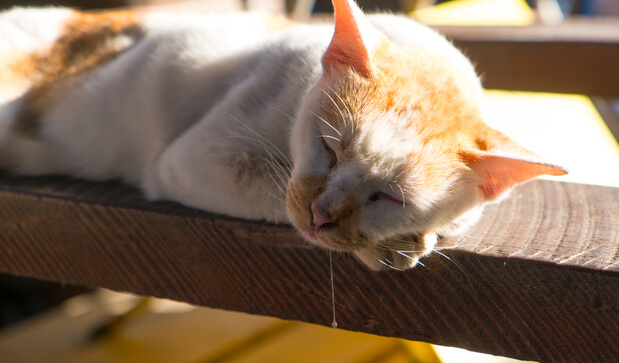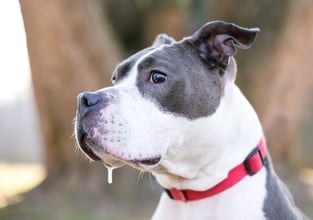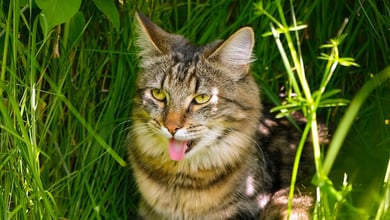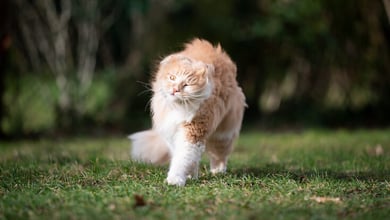Why Is My Cat Drooling? 8 Possible Reasons

Table of Contents
Cats drooling during purring or kneading is a common sign of relaxation. Yet, you might also spot drool or spit bubbles when your cat is stressed or frightened. However, health issues like mouth injuries, dental disease, or toxin exposure could also trigger drooling.
It's essential to observe your cat's behavior and the context in which they're drooling. While occasional drooling with a small amount of saliva is usually no cause for concern, excessive drooling can signal a need to visit your veterinarian. The underlying causes could range from benign to quite serious, and early detection is always in your cat’s best interest.
Same-Day In-Home Sick Pet Visits
Don't wait for your pet's condition to worsen. Our mobile veterinarians provide same-day and next-day in-home sick pet visits. Schedule now for peace of mind.
In the following list, we explore the possible triggers for cat drooling, moving from milder, common causes to more severe health issues.
1. Contentment and Relaxation
When cats are relaxed or content, such as when they're purring, kneading, or getting pet, they might drool a little. This is because their salivary glands are stimulated, leading to excessive drooling, which can be traced back to their kittenhood. You might notice a little wetness around their mouth or on the area where they're sitting or lying down.
2. Stress or Fear
Cats can also drool when they're feeling stressed or scared. This could be a response to a change in their environment, a car ride, or a visit to the vet. You may notice some drool or spit bubbles at the corners of their mouth, often accompanied by other signs of stress like hiding, aggression, or excessive meowing.
3. Oral Discomfort
A cat might drool excessively if something is stuck in their mouth or they´re experiencing oral discomfort. This could be due to a foreign object, a bad tooth, or gum disease. In this case, the drooling might be accompanied by other signs such as refusal to eat, pawing at the mouth, or unusual aggression.
4. A Reaction to Certain Foods or Medications
Sometimes, certain foods or prescribed medications can cause a cat to drool. This could occur if the food or medicine tastes unpleasant or causes a mild irritation in the cat's mouth. Usually, the drooling stops once the cat finishes eating or the medicine has been fully administered.
📒 Note: If the drooling continues, it might be worth discussing alternative options with your veterinarian.
5. Nausea or Upset Stomach
Just like humans, cats can drool when they're feeling nauseous or have an upset stomach. This could be due to something they ate or a gastrointestinal issue. You might notice your cat seems uncomfortable, doesn’t want to eat, or vomits along with the drooling.
6. Exposure to Toxins
In some situations, a cat might come into contact with substances that are toxic to them, such as houseplants, household cleaners, and human medications. This exposure can lead to more severe drooling because these toxins can cause serious harm. Additional signs of poisoning could include vomiting, diarrhea, loss of appetite, or behavioral changes.
📒 Note: If you suspect your cat has been exposed to a toxic substance, it's crucial to seek veterinary attention immediately.
7. Health Issues
Severe health problems, such as kidney disease, respiratory infections, or certain types of cancer, can also cause a cat to drool. These conditions are serious and require immediate veterinary attention. Signs can vary widely but might include changes in eating or drinking habits, changes in behavior, or other unusual symptoms.
8. Heat Stress
In hot weather, cats can start to drool as part of their effort to cool down plus the stress and physical strain on their body can trigger involuntary responses. If your cat is panting, seems lethargic, or has an increased heart rate along with drooling, it could be a sign of heat stress and should receive immediate attention to prevent heatstroke.
When to Consult a Veterinarian
If your cat is drooling excessively or persistently, or if the drooling is accompanied by symptoms like loss of appetite, behavioral changes, vomiting, or difficulty breathing, it's time to consult your veterinarian.
This is also true if the drooling is sudden and your cat appears distressed or in pain. If the drooling is related to stress or fear, it should reduce once the stressor is removed; if it continues or your cat seems anxious, a veterinarian can help with stress management.
Drooling might also indicate serious health issues such as dental disease, exposure to toxins, or severe conditions like kidney disease or cancer, requiring immediate and proper treatment.
Regular veterinary checkups are essential for maintaining your cat's health and identifying potential problems before they become more serious.
Should My Pet Be Seen by a Veterinarian?
1. Have you noticed changes in your pet’s appetite?
2. Does your pet have diarrhea or loose stools?
3. Have you noticed changes in your pet’s thirst/water consumption?
4. Is your pet having accidents in the house?
5. Is your pet pacing and unable to settle?
6. Is your pet panting more than usual?
7. Is your pet whining or vocalizing more than usual?
8. Is your pet shaking more than usual?
9. Is your pet hiding or avoiding physical contact more than usual?
10. Is your pet more lethargic and sleeping more than usual?
11. Are you concerned about changes in your pet’s behavior?
12. Is your pet scratching their ears?
13. Is your pet licking their paws more than usual?
14. Does your pet have a rash?
15. Is your pet moving more slowly than usual or having a harder time getting up or down?
View Results
Should My Pet Be Seen by a Veterinarian?
1. Have you noticed changes in your pet’s appetite?
2. Does your pet have diarrhea or loose stools?
3. Have you noticed changes in your pet’s thirst/water consumption?
4. Is your pet having accidents in the house?
5. Is your pet pacing and unable to settle?
6. Is your pet panting more than usual?
7. Is your pet whining or vocalizing more than usual?
8. Is your pet shaking more than usual?
9. Is your pet hiding or avoiding physical contact more than usual?
10. Is your pet more lethargic and sleeping more than usual?
11. Are you concerned about changes in your pet’s behavior?
12. Is your pet scratching their ears?
13. Is your pet licking their paws more than usual?
14. Does your pet have a rash?
15. Is your pet moving more slowly than usual or having a harder time getting up or down?
Share Quiz
Conclusion
A little drooling from your cat now and then is normal, but if it becomes excessive or consistent, it's time to take note. The causes could range from simple relaxation to serious health issues. Be aware of your cat's regular behavior and seek your veterinarian's advice when something seems off.
Frequently Asked Questions
Why does my cat drool when I pet him?
When you pet your cat, they may feel extremely relaxed and content. This state of bliss can sometimes lead to a bit of drooling. It's generally nothing to worry about unless it's excessive.
Why is my cat drooling all of a sudden?
Sudden, excessive drooling in cats could be a sign of an underlying health issue, like dental disease, mouth trauma, or exposure to toxins. If your cat starts drooling unexpectedly, it's a good idea to consult with a veterinarian.
Is cat drool harmful to humans?
Generally, cat drool isn't harmful to humans. However, it can potentially spread certain diseases like cat scratch fever. If you have a compromised immune system, it's advisable to avoid direct contact with cat saliva.
Is there treatment for excessive cat drooling?
Yes, the treatment for excessive cat drooling depends on the underlying cause. It could range from removing a foreign object from the mouth, treating dental disease, changing the diet, or administering medication. Always consult with a veterinarian for the appropriate treatment.






